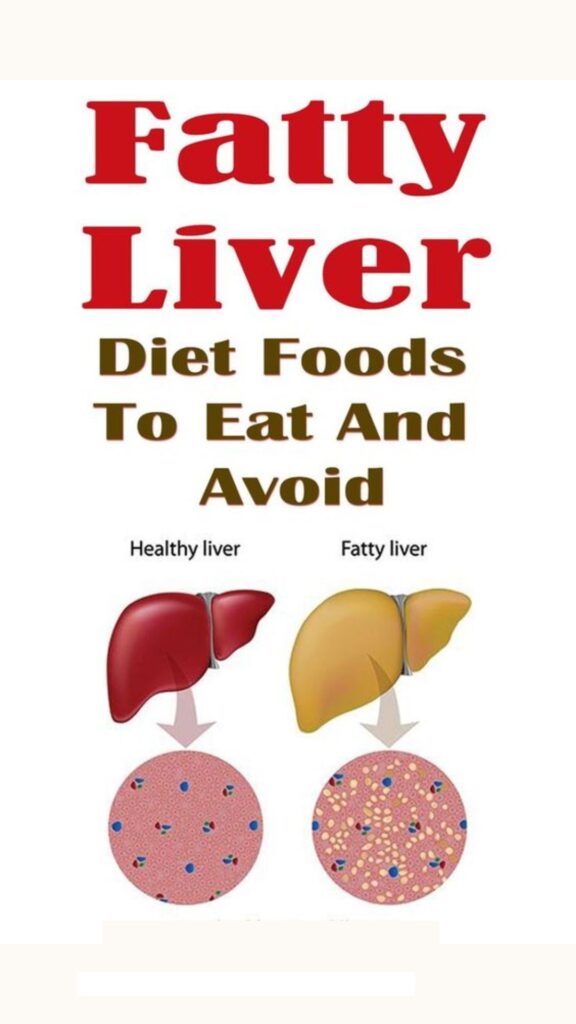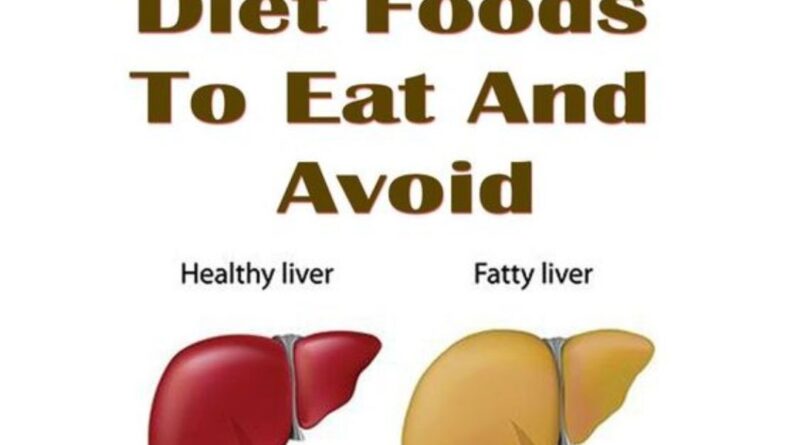“Nature’s Remedies: Discover the Top 11 Foods that Can Naturally Aid in Curing Fatty Liver”
The liver is a crucial organ. It rests on top of your stomach and right kidney in the upper right region of your abdomen. It’s located underneath your diaphragm.
The liver is only roughly three pounds in weight. It is, nevertheless, quite effective. The liver, in fact, performs approximately 500 essential activities.
The liver controls the chemical levels in your blood and excretes bile to eliminate waste from your body. It also creates nutrients by processing and breaking down the blood from your stomach and intestines.
Functions of the liver include:
- Proteins for blood plasma production
- To transport lipids, cholesterol and specific proteins are produced.
- To store energy, excess glucose is converted to glycogen.
- Controlling amino acid levels in the blood
- Keeping blood clots under control
- To combat illnesses, microorganisms are flushed from the circulation.
- Toxins and toxic chemicals are removed from the blood.
- The iron content of hemoglobin is processed and stored.
- Getting rid of bilirubin
What is fatty liver?

Hepatic steatosis is another name for fatty liver. It occurs when the liver becomes clogged with fat. Small levels of fat in the liver are acceptable, but too much can be harmful to your health.
What is fatty liver disease?
Fatty liver disease is a condition that affects the liver.
Steatosis (fatty liver disease) is a frequent disorder caused by a buildup of fat in the liver. There is a modest amount of fat in a healthy liver. When fat accounts for 5% to 10% of your liver’s weight, it becomes an issue.
What are the signs and symptoms of fatty liver?
Until the condition advances to cirrhosis of the liver, people with fatty liver disease frequently have no symptoms. If you do experience symptoms, they might include the following:
- On the upper right side of the abdomen, there is abdominal discomfort or a feeling of fullness (belly).
- Nausea, lack of appetite, or weight loss are all possible side effects.
- The skin and whites of the eyes are yellowish (jaundice).
- Abdomen and legs were swollen (edema).
- Excessive exhaustion or mental disorientation.
- Weakness.
The 11 Best Foods for Your Liver
Here are some of the finest meals for maintaining a healthy liver:
- Fruits
Fruits aren’t all made equal. However, eating a variety of fruits in moderation might help maintain your liver health. Citrus fruits, such as oranges and grapefruits, can aid.
Oranges include Vitamin C, which helps to reduce fat formation in the liver.
Grapefruit antioxidants (naringin and naringenin) have also been demonstrated to protect the liver. Naringenin has also been demonstrated in animal experiments to lower the amount of fat in the liver.
Anthocyanins are antioxidants found in cranberries and blueberries, among other foods. These have been found to protect the liver from harm as well as delay the formation of scar tissue in the liver.
The blueberry extract may potentially prevent the formation of cancerous cells in the liver, although additional study is needed.
Improved liver function has also been related to grape seed extract. Again, additional study is required to identify all of the advantages of grapes.
- Oatmeal
Because of their high fiber content, oats are beneficial to your liver. They’re also high in antioxidants.
Fiber is believed to aid in the rehabilitation of a healthy liver. It’s also been found to help damaged liver cells live longer.
Grains, beans, and berries are just a few examples of high-fiber diets that are beneficial to the liver.
- Cruciferous Vegetables (Cruciferous Vegetables)
Vegetables are well-known for their numerous health advantages. They can help you improve your immune system, avoid chronic illnesses, and improve your mental health, among other things.
Cruciferous veggies are extremely good for the liver. Broccoli, cauliflower, Brussels sprouts, spinach, and other vegetables are among them. They aid in liver detoxification and enzyme equilibrium. 20, 23, 24
Indole2, a chemical present in cruciferous vegetables, can also aid in the prevention and treatment of nonalcoholic fatty liver disease. Fatty liver disease can lead to a slew of additional issues in the future.
Leafy greens like spinach are also high in glutathione, a strong antioxidant. This may aid in the improvement of liver function.
- A variety of nuts
Nuts are simple food that can help your liver stay healthy. They’re high in vitamin E and phytochemicals. They’re also connected to a lower chance of developing alcoholic liver disease.
Almonds, for example, are high in healthful fats that are also beneficial for your heart.
- Fish that contains fat
Unhealthy fats (such as saturated and trans fats) are harmful to the liver, although fatty fish are beneficial. Salmon and sardines collected in the wild are excellent providers of omega-3 fatty acids. Deficiencies can be avoided by eating two to three servings each week.
In moderation, omega-3 fatty acids can help enhance liver function. Cirrhosis damage causes people to have reduced amounts of it. Getting more of it, on the other hand, can help with healing
Anti-inflammatory effects are also seen in omega-3 fatty acids.
- Green Tea
Green tea offers several health advantages. For starters, it has been linked to improved liver health.
Green tea, in particular, can increase liver enzyme levels, reduce oxidative stress, and reduce fat in the liver.
- Beets
Beets are another antioxidant-rich item to consider in your diet.
Beets have been found in animal experiments to decrease inflammation and restrict liver enzymes. Although further study is needed to replicate these findings in humans, beets are undeniably a superfood. 5 – 8 They’re also good for your heart.
- Turmeric
Turmeric is a well-liked supplement at health food stores, and with good reason. It contains anti-inflammatory qualities and may aid in the treatment of liver disease in some cases. Additionally, the spice lowers increased liver enzymes.
- Coffee
Coffee, when used in moderation, can be beneficial to your liver. Caffeine in excess can have negative health impacts, so don’t consume too much.
Coffee used in moderation has been related to a lower risk of liver disease. Coffee drinkers are less likely than non-coffee users to develop cirrhosis.
- Tofu
Because tofu is made of soy, it is excellent for your liver. Soy can aid in the reduction of liver fat accumulation.
Fats are processed by the liver, and soy can help this process run more smoothly. A lower incidence of alcoholic fatty liver disease has also been associated with soy consumption.
Soy is a good source of protein for persons who eat a plant-based diet. Edamame, tempeh, miso, soybean sprouts, soy nuts, and various non-dairy yogurts are other soy foods.
- Extra virgin olive oil
Olive oil is regarded as a healthy fat due to its numerous health advantages, including improved heart and metabolic health.
It does, however, have beneficial benefits on the liver.
A short study of 11 persons with NAFLD discovered that taking 1 teaspoon (6.5 mL) of olive oil per day reduced liver enzyme and lipid levels.
It also increased the levels of a protein linked to beneficial metabolic benefits.
In addition, the subjects had decreased fat formation and improved hepatic blood flow.
Human studies have demonstrated comparable effects of olive oil consumption, including decreased fat deposition in the liver, increased insulin sensitivity, and improved blood levels of liver enzymes in recent years.
The initial stage of liver disease includes fat buildup in the liver. Olive oil’s beneficial benefits on liver fat, as well as other elements of health, make it an important part of a balanced diet.
8 Types of Foods to Avoid if You Have Fatty Liver Disease
Foods to avoid include those that might cause blood sugar to increase or contribute to weight gain, such as:
- Juice, soda, and sugary beverages: Dr. Delgado-Borrego advises her patients to avoid juice, soda, and sugary beverages since “sugars and carbs are the enemies of the liver.”
- Diet drinks that are low-calorie: Low-calorie diet beverages include: Sugar replacements, according to Dr. Delgado-Borrego, which can potentially cause additional liver damage.
- Butter and ghee: Butter and ghee are high in saturated fat, which has been linked to elevated triglycerides in the liver, according to Younan Brikho.
- Sweet baked products and sweets (cakes, pastries, pies, ice cream, cake, etc.): If you’re attempting to reverse fatty liver disease, these sugary carbohydrates will set you back.
- Bacon, sausage, cured meats, and fatty meats: Our specialists advise against eating bacon, sausage, cured meats, and fatty meats since they are high in saturated fats.
- Alcohol: Our specialists advise against consuming alcohol if you have fatty liver disease as a result of heavy drinking since it will only worsen the condition. It’s fine for people with NAFLD to have a drink now and then, such as a glass of wine.
- Foods high in salt: According to some studies, salt consumption worsens NAFLD for two reasons: it often goes with higher fat and higher calorie meals, like some of the others on our list, and it can cause renin-angiotensin system dysregulation, increasing your risk of fatty liver.
- Fried foods: Fried meals are generally heavy in calories, contradicting expert advice to eat a lower-calorie diet.
What’s the quickest approach to get rid of a fatty liver?
Losing weight is one of the quickest methods to decrease liver fat. Reduce the number of calories you consume each day and increase your physical activity to lose weight if you’re overweight or obese.
- Make a conscious effort to eat a balanced diet.
- Exercise and increase your physical activity.
- Maintain control of your diabetes.
- Reduce your cholesterol levels.
- Take care of your liver.
What can be done to avoid fatty liver disease?
The greatest method to avoid fatty liver disease is to keep your overall health in check:
- Maintain healthy body weight. Lose weight gradually if you’re overweight or obese.
- Exercise on a regular basis.
- Consume alcohol in moderation.
- Take your meds exactly as directed.
Last but not the least
Your liver is a vital organ that performs many crucial activities, so you should do everything you can to protect it.
The foods mentioned above have been shown to be good for the liver. Liver problems can even be blamed for your death! So be cautious when eating. Stay healthy by eating healthy.
